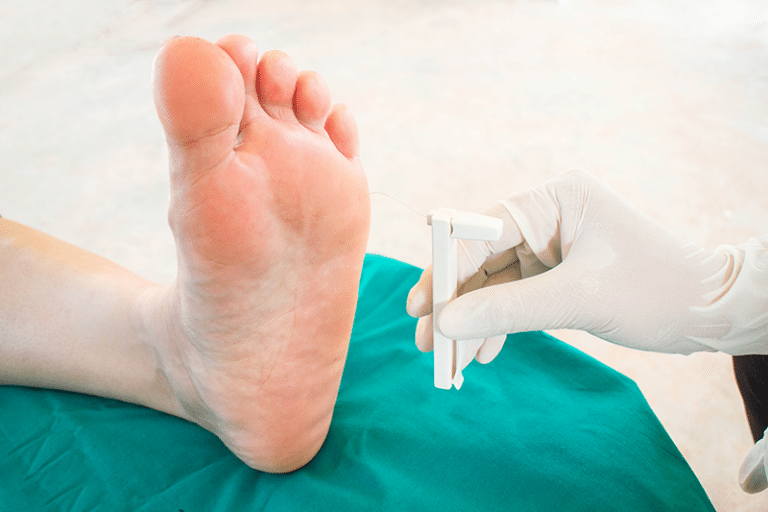
If you or a loved one has been diagnosed with idiopathic neuropathy, you may be struggling to understand this condition and its implications. Momentum Medical is here to help you better understand idiopathic neuropathy and provide you with the support you need.
Idiopathic neuropathy is a complex and often misunderstood condition that affects the peripheral nerves, causing pain, numbness, and weakness in the limbs. It is called “idiopathic” because the exact cause is unknown, making treating it challenging.
Many individuals with idiopathic neuropathy experience challenges in their daily lives and may feel overwhelmed by the lack of information and resources available.
Knowledge is power when it comes to managing idiopathic neuropathy. Our team of experts is dedicated to helping you understand the condition better, providing you with valuable insights, and offering effective treatment options to improve your quality of life.
Whether you are newly diagnosed or have been living with idiopathic neuropathy for a while, we are here to support you every step of the way. Let us help you navigate this journey and find the best solutions for your unique needs.
Idiopathic neuropathy refers to cases where the cause of nerve damage is unknown. It can be a perplexing diagnosis for both patients and healthcare providers, as the exact reasons behind the condition remain unclear. However, there are several theories that researchers have proposed to explain its development.
In autoimmune diseases, the body’s immune system mistakenly attacks its tissues. In the case of idiopathic neuropathy, it is hypothesized that the immune system may target the peripheral nerves, leading to inflammation and subsequent damage.
Some researchers believe that specific individuals may have a genetic predisposition to developing idiopathic neuropathy. However, identifying specific genes associated with the condition has proven challenging. More research is needed to unravel the genetic aspects of idiopathic neuropathy fully.
Exposure to toxins, such as heavy metals or chemicals, has been suggested as a potential trigger for nerve damage. However, identifying the specific environmental factors that contribute to idiopathic neuropathy remains a complex task.
If you suspect that you may be experiencing idiopathic neuropathy, it is crucial to be aware of the different symptoms associated with this condition.
Diagnosis and evaluation of idiopathic neuropathy are crucial steps in determining the cause and extent of this condition. A comprehensive evaluation is required to diagnose idiopathic neuropathy, including a detailed medical history, a physical examination, and various diagnostic tests.
These tests may include nerve conduction studies, electromyography, blood tests, and imaging studies to rule out other potential neuropathy causes. A proper diagnosis and evaluation are essential for developing an appropriate treatment plan and managing the symptoms effectively.
Idiopathic neuropathy, with an unknown cause, presents challenges in diagnosis and treatment, focusing on symptom management after other causes are excluded.
Other neuropathies, like those caused by diabetes, autoimmune diseases, or toxins, have identifiable causes and treatments that address these specific issues. Both types share symptoms like numbness and pain, but their progression and treatment responses differ.
In contrast to other neuropathies, the prognosis for idiopathic neuropathy is unpredictable and dependent on the management of the underlying condition. Understanding these differences is crucial for effective treatment and realistic expectations.
Coping with the physical and emotional challenges of living with idiopathic neuropathy can be overwhelming for patients. Support systems, such as support groups, counseling, and educational resources, can provide patients with the tools and guidance to manage their condition better and improve their quality of life.
These coping mechanisms can help patients navigate the complexities of living with idiopathic neuropathy and find solace in knowing they are not alone in their journey.
At Momentum Injury, our mission is to increase awareness and provide support to those who are impacted by idiopathic neuropathy. We are committed to educating people about this condition and making resources available.
We also help those struggling with this issue by advocating for them and helping them have access to the care they need. Contact us today for more information or to book an appointment.
Serving Volusia, Flagler, Orange, Osceola, Hillsborough, Pasco, Pinellas, and Seminole county patients with back pain conditions, sports injury, work injury, headaches, lower back pain, auto accident injuries, neck pain and more.
Our staff can accommodate Spanish, French and Russian speaking patients. All other languages with enough notice we can schedule a translator.
Todas nuestras localizaciones tienen hablantes de español en el personal.
© 2024 Momentum Medical